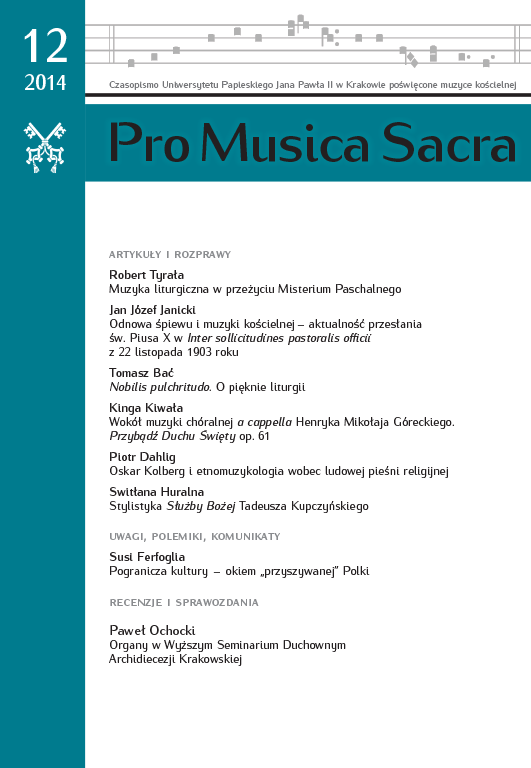Oskar Kolberg i etnomuzykologia wobec ludowej pieśni religijnej
DOI:
https://doi.org/10.15633/pms.1518Słowa kluczowe:
Oskar Kolberg, etnomuzykologia, pieśń religijna, tradycja ludowa, praktyka wokalna, przekaz repertuaru muzycznegoAbstrakt
Niniejszy artykuł przedstawia historię badań nad katolickim śpiewem ludowym w Polsce, ze szczególnym uwzględnieniem pracy największego polskiego etnografa, Oskara Kolberga (1814–90). Karol Kurpiński, kompozytor i dyrektor Teatru Narodowego, inicjator pierwszej debaty na temat muzyki ludowej w 1820 roku, zaproponował funkcjonalne ujęcie pieśni ludowej, której definicja obejmowała także pieśni religijne śpiewane w języku narodowym. Antologie tekstów pieśni ludowych wydawane w latach 30. i 40. XIX wieku zawierały możliwie najbardziej oryginalny repertuar pieśni chłopskich przekazywanych ustnie i pamięciowo. Pieśni religijne, jak wynika z druków, nie były zwykle włączane do badań folklorystycznych, jednak zmiany kulturowe, jakie zachodziły na przestrzeni XIX wieku, skłoniły badaczy do dokumentowania również starszych pieśni religijnych wykorzystanych w tradycji ludowej, takich jak kolędy (Michał Marcin Mioduszewski 1843). W swoich badaniach Oskar Kolberg był skoncentrowany głównie na specyfice regionalnej poszczególnych części kraju, dlatego też znormalizowany repertuar pieśni religijnych wykonywanych w kościołach w zasadzie go nie interesował. Jednak mimo swoich preferencji badawczych Kolberg spisał około 800 pieśni religijnych z bogatej kolekcji 20 tysięcy utworów wokalnych i instrumentalnych. Te 800 utworów wchodzi w skład lokalnych repertuarów towarzyszących obrzędom wielkopostnym, wielkanocnym, bożonarodzeniowym, a także związanym z kultem świętych patronów oraz innym, takim jak np. ceremonie pogrzebowe. Powodem uwzględnienia śpiewów religijnych w pracach Kolberga był również fakt ich ustnego przekazywania, który skutkował ogromną wariantywnością pieśni. Niektóre z wariantów nabierały specyficznych cech określanych przez lokalną tradycję śpiewaczą. Praktyka wykonawcza zyskała od 1970 roku zainteresowanie badawcze zarówno etnomuzykologów, jak i hymnologów, tym bardziej że zawarte w pieśniach elementy chorału gregoriańskiego przetrwały w żywej tradycji aż do naszych czasów.Bibliografia
Bartkowski B., Polskie śpiewy religijne społeczności katolickich. Studia i materiały, t. 1, Lublin 1990.
Bartkowski B., Polskie śpiewy religijne w żywej tradycji. Style i formy, Kraków 1987.
Chybiński A., O metodach zbierania i porządkowania melodii ludowych, „Lud” 12 (1907), s. 171–201.
Chybiński A., O polskiej muzyce ludowej. Wybór prac etnograficznych, red. L. Bielawski, Kraków 1961, s. 23–57.
Dahlig P., Tradycje muzyczne a ich przemiany. Między kulturą ludową, popularną i elitarną Polski międzywojennej, Warszawa 1998, s. 326–349.
Dzieje folklorystyki polskiej 1800–1863, red. H. Kapełuś, J. Krzyżanowski, Wrocław–Warszawa–Kraków 1970.
Kamieński Ł., Monografia pieśni zmówinowej z Kaszub południowych, „Polski Rocznik Muzykologiczny” 1 (1935), s. 107–131.
Kamieński Ł., Pieśni ludu pomorskiego, Toruń 1936.
Kamieński Ł., Z badań nad folklorem muzycznym Wielkopolski, „Sprawozdania Poznańskiego Towarzystwa Przyjaciół Nauk” 3 (1932) (17), s. 52–55.
Kraushar A., Towarzystwo Królewskie Przyjaciół Nauk 1800–1832. Monografia historyczna osnuta na źródłach archiwalnych, księga 3, Czasy Królestwa Kongresowego. Czterolecie przedostatnie 1824–1828, Kraków–Warszawa 1905.
Kunz T. A., Böhmische Nationalgesänge und Tänze, ed. L. Tyllner, Praha 1995.
Kuryłowicz T., Poglądy estetyczne Karola Kurpińskiego, [w:] T. Strumiłło, A. Nowak-Romanowicz, T. Kuryłowicz, Poglądy kompozytorów polskich doby przedchopinowskiej, Kraków 1960, s. 100–189.
Michalec A., Miejsce polskich śpiewów religijnych w „Dziełach wszystkich” Oskara Kolberga, „Twórczość Ludowa” 5 (1990) 4, s. 13–16.
Nowak T., Tradycje muzyczne społeczności polskiej na Wileńszczyźnie, Warszawa 2005.
Nowak-Romanowicz A., Poglądy estetyczno-muzyczne Józefa Elsnera, [w:] T. Strumiłło, A. Nowak-Romanowicz, T. Kuryłowicz, Poglądy kompozytorów polskich doby przedchopinowskiej, Kraków 1960, s. 90–91.
Paprocki B., Pamiątki Kolbergowskie w Przysusze, „Biuletyn Kwartalny Radomskiego Towarzystwa Naukowego”, t. 29, red. G. Kabza, Radom 1992, z. 1–4, s. 59–71.
Przerembska V., Ideały wychowania w edukacji muzycznej w II Rzeczypospolitej, Łódź 2008, s. 132.
Pulikowski J., Geschichte des Begriffs Volkslied im musikalischen Schrifttum, Heidelberg 1933.
Sobieska J., Sobieski M., Wielkopolskie wiwaty, [w:] J. Sobieska, M. Sobieski, Polska muzyka ludowa i jej problemy, red. L. Bielawski, Kraków 1973, s. 219–262.
Sobieska J., Ze studiów nad folklorem muzycznym Wielkopolski, Kraków 1972.
Stęszewski J., Uwagi o etnomuzycznej regionalizacji Polski, [w:] Dyskurs o tradycji. Z zagadnień współczesnej kultury artystycznej w Polsce i ZSRR, Wrocław–Warszawa–Kraków–Gdańsk 1974, s. 323–348.
Tyszkiewicz K., Wilija i jej brzegi pod względem hydrograficznym, historycznym, archeologicznym i etnograficznym, Drezno 1871.
Traditional musical cultures in central-eastern Europe. Ecclesiastical and folk transmission, ed. by P. Dahlig, trans. by J. Comber, Warsaw 2009.
Zoła A., Melodyka ludowych śpiewów religijnych w Polsce, Lublin 2003.
Zubrzycki D., O śpiewach ludu pospolitego, „Pielgrzym Lwowski” 1823, s. 49–50.
Pobrania
Opublikowane
Numer
Dział
Licencja
Autorzy publikujący w czasopiśmie udzielają jego wydawcy zgody o następującej treści:
- Autor zachowuje autorskie prawa majątkowe do utworu, a jednocześnie udziela wydawcy czasopisma zgody na jego pierwszą publikację w wersji drukowanej i wersji online na licencji Creative Commons Uznanie autorstwa 4.0 Międzynarodowe oraz zgody na wykonywanie opracowań, w tym przekładów.
- Autor ma możliwość udzielania zgody niewyłącznej na opublikowanie utworu w wersji, która ukazała się w czasopiśmie (np. zamieszczenia go w repozytorium instytucjonalnym lub opublikowania w książce), wraz z informacją o jego pierwszej publikacji w czasopiśmie.
- Autor może umieścić swój utwór online (np. w repozytorium instytucjonalnym lub na swojej stronie internetowej) jeszcze przed zgłoszeniem utworu do czasopisma.

